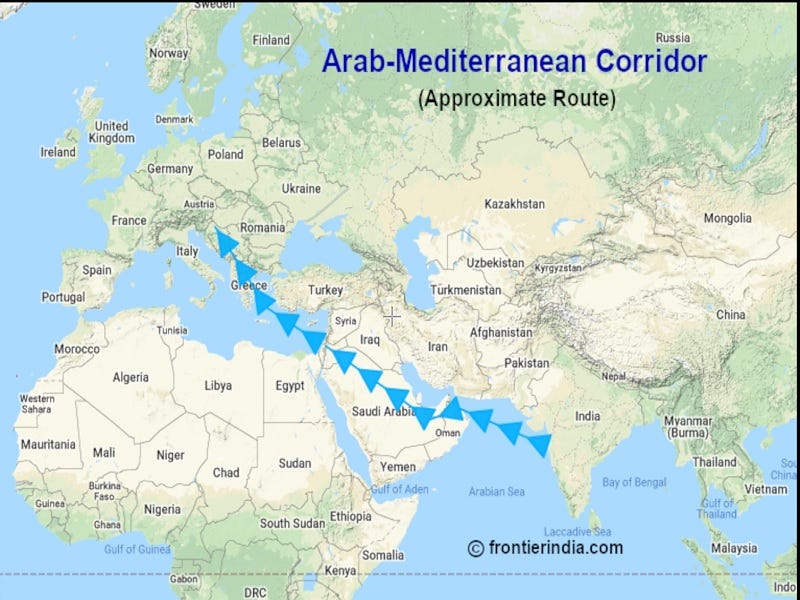There’ll of course be those in the Alt-Media Community who claim that India and the US' shared interests in gently competing with China supposedly prove that the first is the second's “Trojan Horse” in multipolar structures like the SCO, but that divide-and-rule information warfare narrative is discredited by Delhi's strategic ties with Moscow. Furthermore, those who continue to spew it without equally maligning the SCO’s new Emirati and Saudi dialogue partners as supposedly being the same expose themselves as anti-Indian disinformation agents.
Axios reported over the weekend that the American, Emirati, Indian, and Saudi National Security Advisors were planning to discuss what’s previously been described as the Arab-Mediterranean Corridor (ArMedCor) during their first-ever quadrilateral summit. That event already took place by the time of this analysis’ publication, but there wasn’t any clarity about whether they made progress on this connectivity initiative, though it nevertheless has plenty of potential that deserves to be elaborated upon.
Indian grand strategy is predicated on multi-aligning between key players in the global systemic transition to multipolarity with a view towards maximizing its autonomy throughout this unpredictable process. To that end, it envisages connectivity playing a major role in this respect, particularly the North-South Transport Corridor (NSTC) with the Central Asian Republics, Iran, and Russia and the Vladivostok-Chennai Maritime Corridor (VSTC) that transits through Northeast and Southeast Asia.
What’s missing from this emerging geo-economic matrix is a complementary European-directed project, ergo the importance of the ArMedCor that could connect India with the EU via West Asia. It’s in the US interests to facilitate this corridor’s construction in order to bolster India’s role as a partial economic counterweight to China. To be clear, that South Asian state won’t replace its East Asian neighbor as “the world’s factory” anytime soon, but that doesn’t mean that it’s not in the US’ interests to still help it try.
American policymakers are beginning to realize the impossibility of coercing that country into becoming their military proxy against the People’s Republic as evidenced by Ashley J. Tellis’ impressively insightful piece for the influential Council on Foreign Relations’ official magazine earlier this month. Instead of doubling down on this counterproductive policy that risks toxifying their bilateral ties, it’s obviously better for them to focus on this new connectivity-driven dimension instead.
There’ll of course be those in the Alt-Media Community (AMC) who claim that their shared interests in this respect supposedly prove that India is the US’ “Trojan Horse” in multipolar structures like the SCO, but that divide-and-rule information warfare narrative was already comprehensively discredited here. Furthermore, those who continue to spew it without equally maligning the SCO’s new Emirati and Saudi dialogue partners as supposedly being the same expose themselves as anti-Indian disinformation agents.
Connectivity is one of the top trends of the present decade because it’s truly beneficial for all countries. China doesn’t have a monopoly on these sorts of projects via its Belt & Road Initiative (BRI), nor does it aspire for such, so there’s nothing contradictory about supporting both the ArMedCor and multipolarity even though the first-mentioned is aimed at gently competing with Beijing. For this reason, nobody in the AMC should be pressured by key influencers into denouncing this corridor.
To the contrary, they should support it, especially since India and Saudi Arabia plan to play leading roles in this initiative. The first is Russia’s decades-long strategic partner that’s bravely resisted US pressure upon it to dump Moscow, while the second just agreed to a game-changing Chinese-brokered rapprochement with Iran that’s poised to accelerate yuan-driven de-dollarization processes. This means that they’re responsible stakeholders in the multipolar future that the AMC officially supports.
Since official details about the ArMedCor remain scant, there’s no much else that can be said about it, with the present piece having analyzed its potential as best as possible considering the limitations. To summarize, it could complement India and Saudi Arabia’s complementary grand strategies with respect to speeding up transregional multipolar processes. The US’ role doesn’t discredit this project, but simply speaks to policymakers’ belated realization that it’s important to support non-BRI connectivity corridors.




